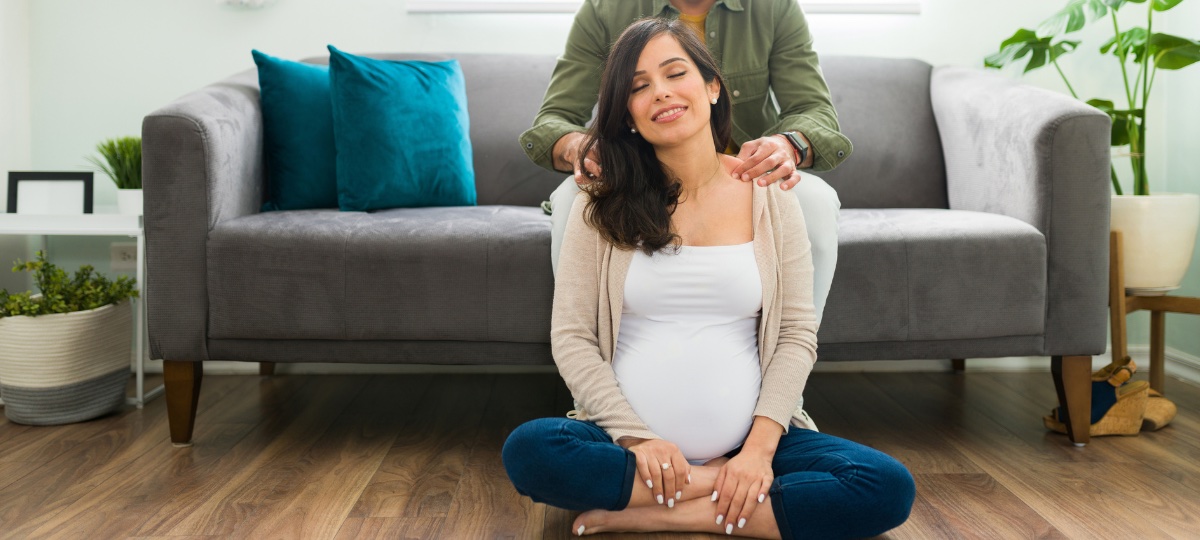Continuing Education
Pregnancy and Massage
Learn how pregnancy, childbirth, and the postpartum period affect women.
Does massage therapy improve mental health during pregnancy?
By Martha Brown Menard, Ph.D., LMT, August 1, 2022

Does massage therapy offer any mental health benefits for pregnant women?
Roughly 20 percent of pregnant women experience clinically significant anxiety and/or depression. Factors that increase the likelihood of these conditions include an unintended pregnancy, higher medical risk and higher perceived risk of complications. Perinatal mental health problems are also estimated to cost over $433 million annually.
Massage therapy is a low-risk, nonpharmacological intervention that has shown some benefit for pregnant women and their infants in prior studies. This Australian pilot study examined the feasibility and acceptability of partner-delivered relaxation massage, as well as whether massage can reduce symptoms of antenatal anxiety, stress and depression.
The study was conducted over a nine-month period and followed the CONSORT Guidelines for randomized controlled trials and the extension for pilot and feasibility trials. Women over 18 years of age and 28–32 weeks pregnant with a low-risk pregnancy and self-reported mild to moderate anxiety assessed using a visual analog scale were eligible to begin study participation. Eligible participants also needed to have a trusted person who could administer a massage. Of the 44 eligible participants, 23 were randomly allocated to the massage group and 21 to a control group consisting of a stress management workshop.
The massage intervention consisted of a two-hour interactive workshop facilitated by a qualified female massage therapist and a midwife. Women and their partners learned about relaxation massage as a strategy to manage stress and mild anxiety. The massage therapist discussed the specific indications and contraindications to massage during pregnancy, followed by demonstration of appropriate techniques, risks and possible side effects.
Women and their partners then practiced the techniques with the massage therapist providing feedback. Participants were also given written information about antenatal mental health and a training video with instructions regarding the relaxation massage practice. Participants were asked to undertake at least one 20-minute massage session per week.
Those assigned to the control group completed a two-hour stress management workshop facilitated by a midwife, where they received information about stress during pregnancy and strategies to manage it, excluding massage. Self-help strategies included exercise, relaxation techniques, diet, social connection and examining their use of technology.
All participants were asked to complete a weekly online diary for the duration of their pregnancy, and recorded treatment compliance, their experiences with the intervention and adverse events. Additional outcomes included a measure of general psychological distress and the discomforts of pregnancy such as pain, fatigue and insomnia.
Psychological distress was measured using the short-form Depression, Anxiety and Stress Scale (DASS-21), which measures self-reported symptoms of anxiety, depression and stress and has been validated for use among pregnant women. Qualitative data was collected during an exit interview with participants within six weeks following birth. Birth outcomes assessed during this postnatal interview included gestation at onset of labor, mode of birth and infant Apgar score (where available) for both groups. Quantitative data was analyzed using ANCOVA and effect sizes rather than p-values.
The primary study outcomes were the feasibility and acceptability of the partner-delivered massage and stress management interventions. Feasibility was assessed through recruitment and attrition rates. While 44 women consented to participate, over one-third (39 percent) withdrew prior to study commencement and only 27 attended the training workshops at 28–32 weeks of pregnancy. Nine women withdrew before the massage workshop and eight withdrew before the self-directed stress management workshop, and their main reason was that they were too busy.
Eighty-six percent of women who participated in the massage workshop completed eight weeks or more of massage and the monthly DASS-21 survey at least twice following the workshop. Seventy-seven percent who participated in the stress management workshop completed eight weeks or more of self-directed stress management strategies and the monthly DASS-21 at least twice following the workshop.
Both groups showed a large effect size for reduction of anxiety and depression symptoms, and a moderate to large effect size for stress reduction. Women in the massage group reported a positive benefit from massage of 78 mm (range 29–100) on a 100 mm visual analog scale.
Limitations of the Study: This pilot study compared two active interventions in a convenience sample. The small sample size and high attrition rates may have resulted in bias. Self-reported mental health data collected was not confirmed by clinical diagnostic interviews.
Implications for Evidence-informed Practice: In spite of the methodological limitations of the study, both partner-delivered massage and self-help strategies appear to reduce symptoms of anxiety, depression and stress during pregnancy, be well-tolerated, and pose little to no risk of adverse events for women during pregnancy.
Massage therapists working with pregnant women may want to devote a session or two to teaching partners how to provide basic massage techniques. More generally, massage therapy provided by a caregiver could offer a low-cost and low-risk intervention to improve mental health in other conditions where medication for symptom management is contraindicated.
Pregnancy and Massage
Learn how pregnancy, childbirth, and the postpartum period affect women.
Benefits of Massage During Pregnancy
Pregnancy often brings life transitions and a new set of challenges. During this time, women experience anatomical, physiological and psychological change.
1. Hall HL, Munk NK, Carr BH, Fogarty SR, Cant RB, Holton SR, Weller CL, Lauche RM. "Maternal mental health and partner-delivered massage: A pilot study." Women Birth. 2021 May;34(3):e237-47.